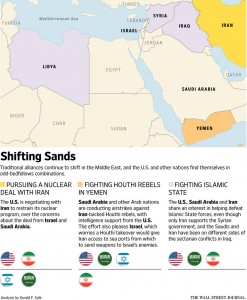from The Wall Street Journal,
3/26/15:
Latest fighting in Yemen complicates relations with Iran as ties with allies are strained.

The Middle East has descended into a state of disarray unusual even for that troubled region, imperiling President Barack Obama’s policy dreams and leaving him with limited ability to control events.
The latest complication has erupted in Yemen, where rebel forces backed by Iran have driven out the country’s president and are expanding their control southward across the country. The prospect that those Shiite rebels might succeed in taking over a neighboring country has so alarmed the Sunni leaders of Saudi Arabia that they have launched airstrikes and assembled an international coalition to intervene—a coalition that the U.S. has vowed to help.
That means the Obama administration finds itself in a highly awkward position: It now is lined up against Iran in Yemen. Meanwhile, it is trying to negotiate a nuclear deal with Tehran and is working on the same side as the Iranians to defeat Islamic State fighters in Iraq.
Moreover, at this moment of high regional anxiety, Mr. Obama finds his ties to Israel and Egypt, two traditional bulwarks of pro-American sentiment, under great strain. And his dream of smoothly exiting the long wars in Iraq and Afghanistan suffered a double blow this week as U.S. planes had to spring back into action in Iraq in an attempt to push back Islamic State forces, and Mr. Obama agreed to keep in Afghanistan thousands of troops he had hoped could leave by year’s end.
The upshot is that Mr. Obama is engaged in a juggling act, trying to keep aloft a nuclear deal with Iran, the fight against Islamic State and an effort to prevent Yemen from sliding into hostile hands—all without the kind of military presence or solid phalanx of loyal allies the U.S. once had at its disposal. Though Washington is increasingly confident of a nuclear deal with Iran, it doesn’t have the same ability to drive developments elsewhere.
Israel has grown so opposed to the emerging nuclear agreement with Iran that Prime Minister Benjamin Netanyahu has repeatedly pledged to use his political clout in Washington to try and sink the diplomacy. Egypt’s new President Abdel Fatah Al Sisi, a former general, meanwhile, has repeatedly questioned the U.S.’s commitment to fighting extremism in response to the White House’s reluctance to bless his ascent to power last year.
The White House argues an accord with Tehran could both stanch the spread of nuclear technologies in a volatile region and perhaps also open up the path for cooperation with Iran against militant Sunni groups like Islamic State and al Qaeda. That would help calm the region.
But those shared interests also are in question. On Thursday, three Shiite militias close to Iran said they were pulling out of the fight to liberate Tikrit to protest the American airstrikes on the city. Some Iranian military advisers have been embedded in these units, according to U.S. officials, raising questions in Washington of whether Tehran ordered the pullout.
For now, the high priority attached to nuclear negotiations with Iran is fueling distrust among regional allies. In particular, Saudi Arabia and Israel worry that the U.S. is beginning to realign its regional policies by banking on closer ties with Tehran. Diplomats and analysts say such perceptions—also widely held in Egypt and the United Arab Emirates—have prompted America’s Arab allies to strike out on their own to take on Iranian proxies.
More From The Wall Street Journal (subscription required):
















